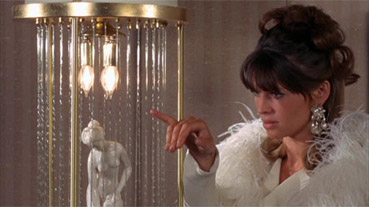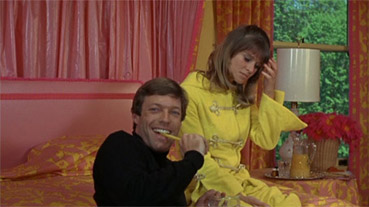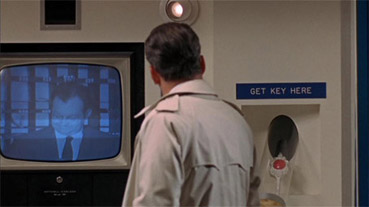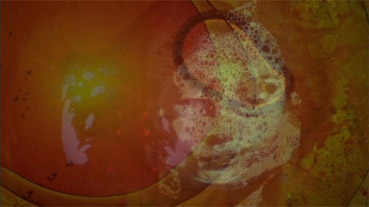| |
"Don't look for happiness, Richie. It will only make you miserable." |
|
Bea, Lovers and Other Strangers, 1970. |
|
|
| |
"[T]he future becomes the present, the present becomes the past, and the past turns into everlasting regret if you don't plan for it!" |
| |
Amanda Wingfield, in Tennessee Williams' The Glass Menagerie, 1945. |
Some films can transcend the boundaries of their making, and rise phoenix-like either into the critically-lauded, upper atmosphere of the film canon, like Nosferatu, Citizen Kane and Taxi Driver or it can entrench itself into the heart of the popular consciousness, life-affirming and iconic, like Quadrophenia, Help!, A Hard Day's Night, or Grease. Others are so sunk, so tied to their period, they creak with age, preserved in aspic – or these days between the layers of a DVD – that they took laughable and cannot affectively be appreciated, even under the category of a guilty pleasure. Where Richard Lester's 1968 film, Petulia, would be posited on such a spectrum is hard to gauge.
It certainly comes with a high pedigree, dripping with as much star power wattage, and glamour as the bejewelled attendees of the film's 'Shake for Highway Safety' charity ball. With Julie Christie, George C. Scott and Richard Chamberlain on its bill, Lester in the director's chair, photography by the soon-to-be director, Nicholas Roeg, scoring by John 'Bond' Barry, alongside additional musical cameos by Big Brother & the Holding Co., Janis Joplin and the Grateful Dead, it sounds like it has cult classic written over it, but, is it?

In truth, I am still not entirely sure. Petulia seems to be a rather unfortunate victim of circumstance. All set to compete at Cannes – which undoubtedly ticks the cultural cachet, art cinema, critically lauded box rather than the throwaway 1960s artefact one, but of course, events that year in Paris the saw the festival cancelled. There is no telling – without the aid of a time machine, and/or access to a parallel universe in which Paris '68 never occurred – whether the Cannes jury would have been wowed or disappointed by what saw, and whether it would have triumphed or flopped come awards time.
When it did finally get a release, the reception was most certainly a mixed bag. While some quarters of the press gave it warm praise, while others, most notably the film critic leviathan Pauline Kael, derided it, blaming the press for giving Lester too many column inches, dubbing it the "come-dressed-as-the-sick-soul-of-America-party."
Divided opinion is of course, not uncommon. By nature, the practice of reviewing is an inherently subjective one. But, in the case of Petulia it points to a wider, generational division, which the film itself and even its publicity alludes to. "If you're like most, and get with it pretty quickly, you'll have lot to talk about afterward," the deep-voiced narrator of the film's behind-the-scenes feature proclaims. Amusing 1960s lexicon aside, it does say a great deal about the kind of film this is. In short, you either get it or you do not.
The film is made in a style which speaks to, engages with and explores a very specific culture and its participants. As a consequence, the worst thing we can do as viewers is to look at it with 2009 eyes. By today's standards, it does look rather tame, and Petulia's so-called 'kooky' behaviour is more perceptive and forward-thinking than the wild eccentricity the term implies. To ignore the fact that it is a product of its time would ignore the real meaning and intent behind the characters various neurosis, be it Archie, as he searches for something more, or Petulia's need to find the perfect and, ultimately unattainable image of romantic love. Love story it may be, but it is certainly not the kind of epic, sweeping love story that made Christie famous just three years earlier. Petulia is no Lara, and David is no Doctor Kildare. Casting Christie and Chamberlain against type is one of the film's cleverest moves, and certainly proves in no uncertain terms that both have many more strings to their bow than their respective award cabinets attest. Indeed, Lester has stated that Christie was the only person he ever envisaged playing her, and now having seen her do it I have to agree.

Appropriately, given the film's plot, it feels like a film full of potential that is never quite fulfilled, though it tries incredibly hard to do so. Based on John Hasse's satirical novel, Me and the Arch Kook Petulia, the story centres upon newly married socialite, Petulia (Julie Christie). If she were around today, she would probably have an MTV or Bravo reality show dedicated to chronicling her every move in The Real Housewives of... mould. A housewife of the OC or New York she may not be, but, she is a Desperate and lonely one, thanks to her violent husband, David (Richard Chamberlain). She takes solace in a romantic affair with a recently divorced doctor, Archie (George C Scott), whom she meets at a charity ball. The pair struggle to repair their lives and each other, but their progress is constantly thwarted by those around them, and the strength of the ties that bind, threaten to break, and often separate them.
All of this set against the backdrop of a rather soulless and ever-increasingly automated world. This is where Lester falls down, and the symbolism becomes just a little bit too heavy handed. We do not necessarily need to repeatedly see the ostentatious, bizarre, futuristic (and also oddly nostalgic), and ultimately useless gadgets that fill the Danner marital home and Archie's bachelor pad to understand that they are using them to fill the emotional void in their lives and assuage their feelings of loneliness.
At times, the dialogue makes Archie, Petulia, and those around them a little too self-aware – in a kind of talky, over analytical, Woody Allen type manner – it sometimes makes it difficult to engage with them as people and take them seriously. The fact that they are aware that they are trapped; running like mad on the treadmill of their own lives does give Petulia a strange air of tragedy. The fact that their behaviour – especially Petulia's – just seems to perpetuate that misery, makes the feelings more intense. By showing their flaws, their sadness and their inability to effect change upon either, Lester asks his audience to reflect upon their own lives.
Perhaps the greatest difficulty with Petulia is not the characterisation, but the style of the film itself. Lester's use of temporal and spatial dislocation, may make the film visually interesting and structurally innovative, but it does leave one constantly questioning, searching for the whos, hows and wheres of it all, much like his protagonists. It may be set in San Francisco, but it has a European flavour. Lester has stated he was inspired the new wave filmmaking, and this is never clearer during the moments where he takes a leaf from the book of Alain Resnais, most notably referencing his stylish, heartbreaking examination of doomed love, Hiroshima mon amour (Hiroshima, My Love). Like Resnais, Lester uses jump cuts to replicate memory, showing that we are never quite in one place at any given time, put across beautifully during Archie's meeting at a club with his colleague Barney.

What, ruins, or rather sours Petulia, is the film's cold, bitter undertone, which would become evermore prominent in Lester's later features. Though it is an exploration of newness and change, the film is also about the death of something. The lives that Petulia, Archie and people like them lead were about to end. The idealism hope, and sheer overabundance of wealth (whether material or fiscal) of the decade had given way to a darker presence. 'Free love' was coming to an end and would have a higher cost than anyone would ever realise. The Summer of Love would all too soon become the Winter of Discontent.
It is almost as if Lester was destroying his reputation from the inside out in order to make way for something new. In doing so, he also denied what had made him successful by exposing the light, fun, hipster-comedies that had come to define is work as something of a hollow myth, and pivotally, something that could never be returned to. Like Petulia and Archie, we can only go forward, and never go back.
Richard Lester so vividly depicted and is ultimately synonymous with, the era of rose-coloured glasses, and Petulia too, is bright and bold to the point of garishness, thanks to Nicholas Roeg's cinematography, which renders Lester's vision into an explosive ode to psychedelia; hyper-real and hallucinatory, this is life with the colour dial turned all the way up without any kind of respite. In the closing moments of the film, though, it feels like he is unceremoniously tearing that life apart front of our faces and stamping upon it. Simultaneously, he leaches that colour away, turning that dial in the opposite direction, revealing the truth behind all of his artifice, and in turn, that of late 1960s life; like revealing the great and powerful Oz to be a tiny old man entrusted with the operation of many, many levers.
Perhaps he felt he had the right to.
A first rate transfer from a close to pristine source, the picture really shines, with excellent contrast and pin-sharp detail. The colours are bright but sometimes have that slightly side-stepped from true life look to them that was common in films (or should I say film stocks) of the period. When strong colours do appear they are always solid – the vivid red lighting that washes over a bar displays not a hint of bleed, not does it significantly degrade the detail or contrast. The picture is anamorphically enhanced and the framing 1.78:1, an unlikely aspect ratio for a 1968 film that suggests slight cropping or opening of a more probable 1.85:1 matte.

The Dolby 2.0 mono soundtrack is clean of noise, with the dialogue and music both clear, despite a slight narrowing of the dynamic range expected of a film made in 1968. Even the loudness of a roller rink only displays a hint of distortion.
The disc is supplemented with two vintage extras in the form of a trailer and a making of featurette. Given the film's age, they were a welcome surprise.
By today's standards the trailer (2:58) presented here seems incredibly long. It is ostensibly sectioned into three parts, with the dialogue and scenes concentrated in the latter two thirds. In keeping with the film's style, it employs speedy jump cuts, vivid purple and read freeze frames marking out the trailer's different sections alongside a 'voice of God' narration ("Its name is Petulia," he intones), and the film's title presented repeatedly in various typographies. Interestingly enough, the narration actually explains more of the film's plot than the actual film ever does.
Petulia: The Uncommon Movie (12:14). This heavily pro-studio piece is a mixture of behind-the-scenes footage, sequences from the film itself, and material of San Francisco circa 1967, peppered with voiceover contributions from Richard Lester, George C. Scott and Julie Christie. While it may be heavy on style, light on substance, and at times sounds like an informerical for the San Francisco tourist board, it is an enjoyable peek at the promotion-based features of the period; even if the appreciation for Lester's talent boarders on the over zealous.
Having grown up with VHS and latterly, DVD and Blu-ray, I am always curious to see how films used to be marketed and their production explored before the businesses of making movies became a somewhat more transparent affair, and EPKs and the like became a normal and expected part of any film experience. As well as an amusing curio, they offer a neat little window on what used to get people in line at the box-office, as well as the kind of audience Warner and Seven Arts were targeting at the time. Though the disc is lacking the retrospective feature The Uncommon Making of Petulia, (which is present on the 2006 Warner pressing), this Digital Classics release has much to recommend it.
It would be easy to dismiss Petulia as a late 1960s oddity which offers little to the modern viewing audience, and at times, it very much shows its age. An odd film it may be, but when considered in context, it is an ambitious and innovative one.
While it is not the easiest of films to follow – even in the era of the fast cut, which Lester arguably pioneered and wider embracement of the nouvelle vague-inspired non-linear editing style which he so admired – or enjoy in the classical, frothy romance sense, it is simply too dark and strange for that. Indeed, the very peculiar nature of the film which elevates it beyond our expectations. Like Petulia herself, become used to what the film is you can appreciate what it is and what it does. Having done so, it becomes infinitely more pleasurable and much more to say than its relentlessly hip yet self-aware tone implies.
No one has ever really been able to tap into and present culture and/or counter-culture in the effortless yet detailed manner Richard Lester does. Faults aside, it is still an intriguing film. However, it is also important to recognise the considerable achievements Nicholas Roeg makes in regard to Petulia's distinctive aesthetic. Without Roeg, this film would not be half as visually powerful as it is. |